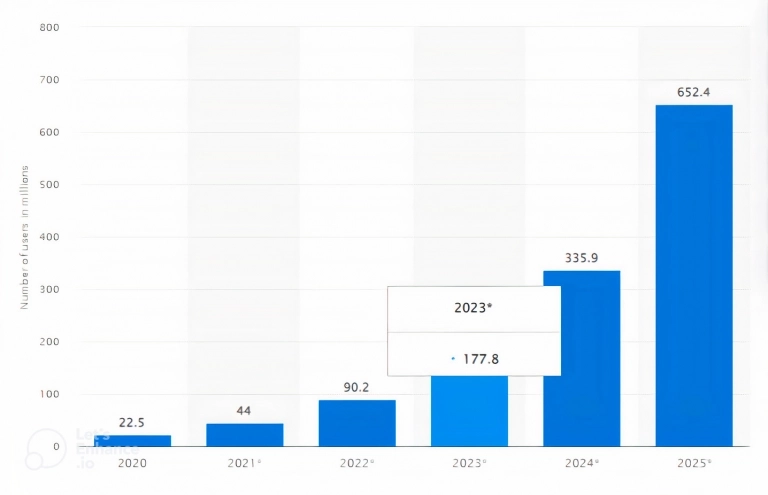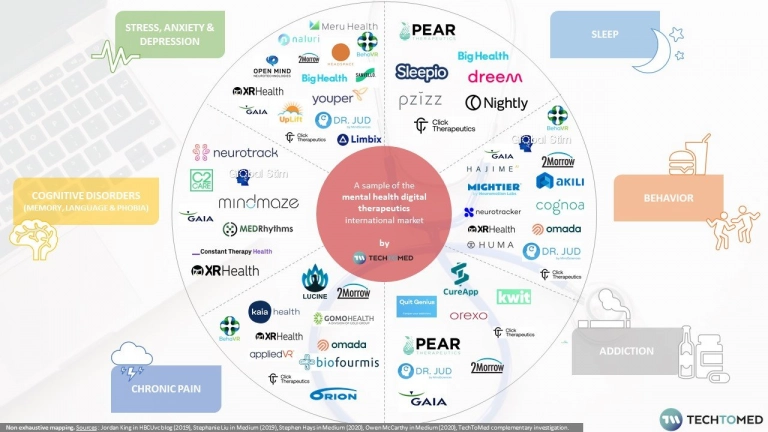Digital therapeutics in mental health focuses on complementing and improving existing treatments. Its patient-centric methods extend a helping hand to millions of people living with depression, PTSD, ADHD, schizophrenia, anxiety, and substance use disorders. The share of digital therapeutics for mental health is close to 30% of all DTx solutions , making it the most popular area in the DTx industry.
Many pharmaceutical and healthcare companies are already exploring innovative approaches to developing DTx solutions, from AI-powered chatbots to virtual reality therapy.
The global digital therapeutics market is expected to expand rapidly in the next 10–15 years. According to various estimates, the compound annual growth rate could be from 20% to 31%, and the market worth could reach up to billion by 2030 .
At Binariks, we have outstanding experience in creating custom DTx platforms. So if you want to develop your own digital therapeutics and mental health products, contact us for expert advice.
Growth of digital therapeutics
Due to increased digitalization, the healthcare industry has seen significant changes in recent decades. The development of smart medical devices, electronic health records, telemedicine consulting services, and more have allowed for better health monitoring and treatment on either inpatient or outpatient basis.
The term "digital therapeutics" appeared in 2012 when the digital health company Propeller Health developed a device to help people manage their asthma. Since then, DTx has grown rapidly. More and more companies have started creating software-based solutions aimed to treat, manage or prevent a range of conditions, from diabetes to sleep disorders.
Although such digital interventions are sometimes confused with regular wellness apps, they have more in common with pharmaceuticals in terms of development.
DTx solutions are based on evidence. They require clinical research, testing, and randomized controlled trials to demonstrate their clinical value and gain regulatory approval.
Such a rigorous, detail-focused approach allows DTx products to improve access to proven therapy and the effectiveness of pharmaceuticals. It increases the range of collected data, and bridge patient care gaps.
Here is how these and many other benefits of digital therapeutics (DTx) gradually improve healthcare delivery worldwide.
DTx for mental health treatment
Like other DTx solutions, digital therapeutics for mental health utilize mobile apps, wearables, or other digital platforms to drive a patient's engagement, deliver personalized interventions, and collect the necessary data.
Interestingly, DTx in mental health treatment is usually based on cognitive-behavioral therapy (CBT). And the very nature of how people use their devices, apps, social networks, and other interactive media are also based on CBT principles.
The DTx technology integrates into the patient's habitual patterns and routines, which, in turn, is essential for supporting behavioral health.
Let's consider a few applications of DTx in mental health treatment:

DTx Solution Engineering
In-app experience development for DTx application
Attention Deficit Hyperactivity Disorder
Digital therapeutics can be used in conjunction with pharmacotherapy in the treatment of ADHD.
As studies have shown, DTx solutions like video games can help minimize the risk of addiction (ADHD medications are potentially addictive) and improve focus and concentration skills.
Post-traumatic Stress Disorder
Post-traumatic stress disorder (PTSD) is a severe mental condition affecting nearly 8% of Americans.
As medication is no longer the preferred first-line treatment for PTSD , DTx can be a beneficial solution to support trauma-focused psychotherapy.
Depression
Various mental health technology-based tools like wearable devices for depression care, mobile apps, etc., can be used as a complementary to medication and counseling or as the most available alternative. Dtx solutions help improve depression symptoms by providing personalized CBT-based support 24/7.
Schizophrenia
The treatment of schizophrenia is centered on increasing adaptive functioning and alleviating the cognitive symptoms of the disorder.
CBT-based DTx may be beneficial as an adjunct to prescribed antipsychotic medications. These tools help patients manage and monitor their moods and symptoms and enable healthcare providers to intervene promptly when necessary.
Substance abuse
DTx addresses the growing demand for affordable substance abuse treatment by providing remote monitoring and support, self-help resources, and relapse prevention options.
DTx solutions help to track the patient's substance use, cravings, and triggers, enhancing engagement and treatment adherence.
Anxiety
DTx for managing anxiety encourages the patient to play a proactive role in treatment.
By working toward progress every day through exercises and games, the patient can gain new skills and learn relevant relaxation techniques and behavior patterns to self-manage their stress.
Architecture Consulting for DTx Solution
Architecture Consulting For Integrated Patient Management Tool
Challenges in DTx for mental health
Despite all the promising prospects of digital therapeutics and mental health DTx products in particular, there are still several challenges in implementing these treatments, requiring time and additional attention.
Lack of regulatory frameworks and standards
DTx is a relatively new field, and there is a lack of regulatory frameworks and standards for evaluating and approving digital mental health interventions.
Privacy and security concerns
The use of digital platforms for mental health treatment raises concerns about data privacy and security, as sensitive information is transmitted and stored online.
Limited research on efficacy and effectiveness
While there is growing evidence supporting the effectiveness of DTx for mental health, more research is needed to establish its long-term efficacy, effectiveness, and safety.
Limited integration with traditional mental health care
DTx may not be integrated enough into traditional mental health care. That leads to fragmentation of care and potential gaps in treatment.
DTx providers should ensure their platforms are integrated within the electronic health record (EHR) or other software used by health professionals.
The future of DTx in mental health
DTx solutions have seen a significant increase in adoption in recent years. During the COVID-19 pandemic, the number of patients using these treatments doubled and reached 44 million users by 2021. According to Statista's forecast , this growth trend will continue for the next 3 years.

The other industry analysis shows that more than 40% of all DTx clinical trials conducted between 2010 and 2019 were related to mental health treatments. And this trend is also expected to remain firm. The reason is that mental health illness is rising exponentially in the US and globally, as is the demand for accessible DTx solutions and other e-mental health services.
Despite all this, digital therapeutics does not aim to replace in-person therapy and pharmaceuticals.
Used together with traditional methods, DTx can improve outcomes and strengthen patient engagement in their therapeutic pathway.
And in cases where DTx can be used as a standalone therapy, this solution helps to address the lack of mental health access. With the increasing availability of smartphones and the internet, digital therapeutics can provide timely and cost-effective interventions to individuals who may not otherwise have access to mental health services.
To get a better view of the market, please refer to our blog article about key companies making significant contributions to DTx growth.
Read also: Digital Biomarkers Examples in Healthcare
Build compliant and secure DTx solution with us
Examples of DTx mental health platforms
There are more than 150 ranging from large to very small players operating in the digital therapeutics market, with over 400 DTx solutions, including those still under development.

All these products can vary by primary purpose, therapeutic area, target audience, type of business model, and more. Here are some examples:
Company | Product | Indication | For whom | FDA-authorized |
Akili Interactive | EndeavorRx | ADHD | Children ages 8-12 years old | Yes |
Feel Therapeutics | Feel DTx | Major depressive disorder and generalized anxiety disorder | Adults 18 years or older | No |
Freespira Inc. | Freespira | PTSD, panic disorder | Patients over 13 years old | Yes |
Big Health | Daylight | Generalized anxiety disorder | Adults 18 years or older | No |
To get a better view of the market, please refer to our blog article about key digital therapeutics companies making significant contributions to DTx growth.
Our experience
Binariks has expertise in developing digital solutions for top DTx providers in the USA and EU. Our development services include a complete range of capabilities, from product discovery and UI design for custom DTx solutions to regulatory compliance consulting and post-launch maintenance.
Binariks' portfolio of digital therapeutics solutions includes telemedicine and remote patient monitoring products , IoT solutions, self-management apps, and AI-based healthcare apps.
Our dedicated team of specialists can assist you in refining your product idea and guide you through each stage of the development process.
Final thoughts
The impact of DTx in mental health management continues to grow, and we can expect to see more effective and innovative approaches to mental health treatment.
Flexible and confidential approaches provided by DTx help promote global mental health by:
- contributing to the destigmatization of mental disorders;
- improving healthcare equity;
- increasing the range of collected data both from individuals and populations, which is essential for the purpose of research.
By combining technology with evidence-based therapeutic approaches, digital therapeutics are already starting to revolutionize mental healthcare. Its personalized, accessible, and scalable interventions carry the potential to improve outcomes for individuals around the world.
Contact Binariks if you'd like to contribute to this rapidly growing market and build your DTx solution.
FAQ
Share

